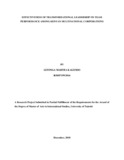| dc.description.abstract | Multinational Corporations worldwide have received support following their influence on world economies in regard to the taxes they give to host governments as well as availability of labor through job creation. The success of these corporations has not only been due to uptake of cheap labour and raw materials from developing countries but also the form of leadership applied. MNCs are a good example of dynamic work environment where global teams face diverse challenges relating to different cultures, nationality, race, time zones, power structures and other perceived employment rights and privileges that often differ from their countries of origin. The most effective form of leadership therefore, is one that puts into account all these challenges and taps into the potential of all the players to produce optimal organizational results. This study, thus sought to determine whether transformational leadership was effective in achieving team performance in the Kenyan MNCs by analyzing the effect of idealized influence, inspirational motivation and intellectual stimulation on the teams. Descriptive Research Design was used with the target population being all the 71 MNCs in Kenya that either had their headquarters in Nairobi or whose base operation was in Nairobi. A census was carried out where the Human Resource Team Leaders in all the 71 MNCs participated. Semi-structured questionnaires with both open and closed ended questions were used to obtain primary data. SPSS version 12 was used to analyze quantitative data that was then presented using descriptive and inferential statistics in form of means, standard deviations and percentages. Thematic analysis was used for the qualitative data with presentation being in narratives and themes. Results indicated that all the three aspects of transformational leadership; idealized influence, inspirational motivation and intellectual stimulation were highly effective in achieving team performance as they led to a more satisfied work force and high performing teams. Findings from this study may be used to prepare programs to be used during strategic leadership training for international assignees before undertaking international projects. Organizations my additionally use the results to carryout leadership development processes such as mentoring, coaching and succession planning by identifying long serving leaders with exceptional transformational skills and matching them with upcoming new leaders. | en_US |



